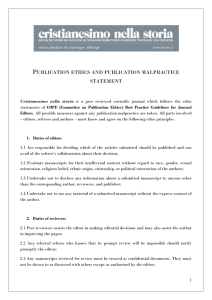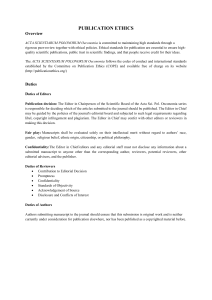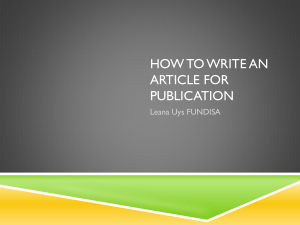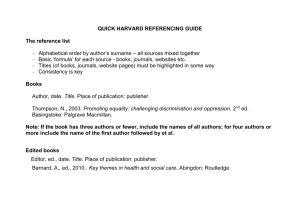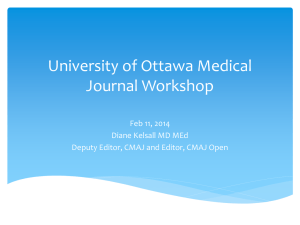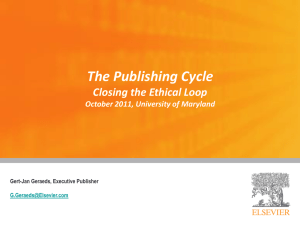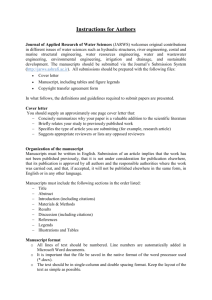Ethical Guidelines - Journal of Pharma Creations
advertisement
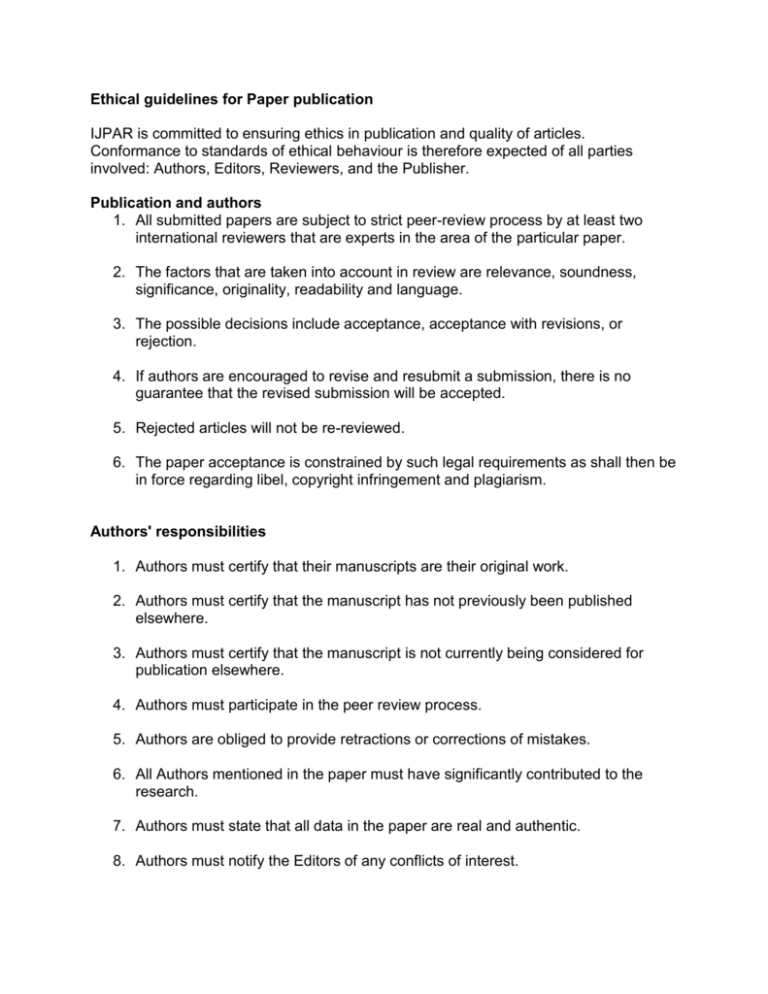
Ethical guidelines for Paper publication IJPAR is committed to ensuring ethics in publication and quality of articles. Conformance to standards of ethical behaviour is therefore expected of all parties involved: Authors, Editors, Reviewers, and the Publisher. Publication and authors 1. All submitted papers are subject to strict peer-review process by at least two international reviewers that are experts in the area of the particular paper. 2. The factors that are taken into account in review are relevance, soundness, significance, originality, readability and language. 3. The possible decisions include acceptance, acceptance with revisions, or rejection. 4. If authors are encouraged to revise and resubmit a submission, there is no guarantee that the revised submission will be accepted. 5. Rejected articles will not be re-reviewed. 6. The paper acceptance is constrained by such legal requirements as shall then be in force regarding libel, copyright infringement and plagiarism. Authors' responsibilities 1. Authors must certify that their manuscripts are their original work. 2. Authors must certify that the manuscript has not previously been published elsewhere. 3. Authors must certify that the manuscript is not currently being considered for publication elsewhere. 4. Authors must participate in the peer review process. 5. Authors are obliged to provide retractions or corrections of mistakes. 6. All Authors mentioned in the paper must have significantly contributed to the research. 7. Authors must state that all data in the paper are real and authentic. 8. Authors must notify the Editors of any conflicts of interest. 9. Authors must identify all sources used in the creation of their manuscript. 10. Authors must report any errors they discover in their published paper to the Editors. Reviewers' responsibilities 1. Reviewers should keep all information regarding papers confidential and treat them as privileged information. 2. Reviews should be conducted objectively, with no personal criticism of the author 3. Reviewers should express their views clearly with supporting arguments 4. Reviewers should identify relevant published work that has not been cited by the authors. 5. Reviewers should also call to the Editor in Chief's attention any substantial similarity or overlap between the manuscript under consideration and any other published paper of which they have personal knowledge. 6. Reviewers should not review manuscripts in which they have conflicts of interest resulting from competitive, collaborative, or other relationships or connections with any of the authors, companies, or institutions connected to the papers. Editors' responsibilities 1. Editors have complete responsibility and authority to reject/accept an article. 2. Editors are responsible for the contents and overall quality of the publication. 3. Editors should always consider the needs of the authors and the readers when attempting to improve the publication. 4. Editors should guarantee the quality of the papers and the integrity of the academic record. 5. Editors should publish errata pages or make corrections when needed. 6. Editors should have a clear picture of a research's funding sources. 7. Editors should base their decisions solely one the papers' importance, originality, clarity and relevance to publication's scope. 8. Editors should not reverse their decisions nor overturn the ones of previous editors without serious reason. 9. Editors should preserve the anonymity of reviewers. 10. Editors should ensure that all research material they publish conforms to internationally accepted ethical guidelines. 11. Editors should only accept a paper when reasonably certain. 12. Editors should act if they suspect misconduct, whether a paper is published or unpublished, and make all reasonable attempts to persist in obtaining a resolution to the problem. 13. Editors should not reject papers based on suspicions, they should have proof of misconduct. 14. Editors should not allow any conflicts of interest between staff, authors, reviewers and board members. DUTIES OF REVIEWERS: Guidelines to Reviewers The unpublished manuscript is a privileged document. Please protect it from any form of exploitation. Reviewers are expected not to cite a manuscript or refer to the work it describes before it has been published, and to refrain from using the information it contains for the advancement of their own research. A reviewer should consciously adopt a positive, impartial attitude towards the manuscript under review. Your position should be that of the author's ally, with the aim of promoting effective and accurate scientific communication. If you believe that you cannot judge a given article impartially, please return the manuscript immediately to the editor with that explanation. Reviews should be completed expeditiously, within two weeks. If you know that you cannot finish the review within the time specified, please inform the editor. A reviewer should not discuss a paper with its author/s. If you want to consult a colleague or junior please discuss this with us first. Please do not make any specific statement about acceptability of a paper in your comments for transmission to the author, but advise the editor on sheet provided. In your review, please consider the following aspects on the manuscript as far as they are applicable: 1.Scientific reliability 2.Importance (clinical or otherwise) of the question or subject studied 3.Originality (truly original or known to you through foreign or specialist publications or through the grapevine) 4.Adequacy of abstract, key words. 5. Appropriateness of approach or experimental design, adequacy of experimental techniques (including statistics where appropriate, need for statistical assessment). Methods adequately described? Appropriate? Patients studied adequately described and their condition defined? 6. Results relevant to problem posed? Credible? Well presented? 7. Soundness of conclusions and interpretation. Interpretation and conclusions warranted by the data? Reasonable speculation? Is the message clear? 8. Relevance of discussion 9.References up to date and relevant? Any glaring omissions? 10. Relevance of the figures and table, clarity of legends and titles. 11. Suitability for the TP and overall recommendations. Appropriate for general readership or more appropriate for specialist journal? 12. If not acceptable can the paper be made so? 13. Ethical aspects 14.Overall presentation (including writing style, clarity of writing)
